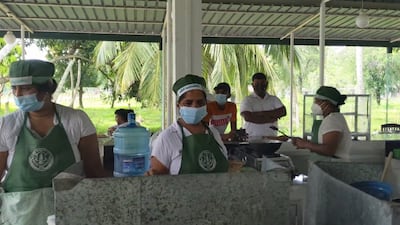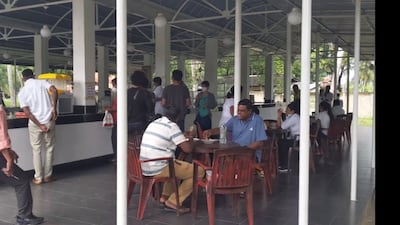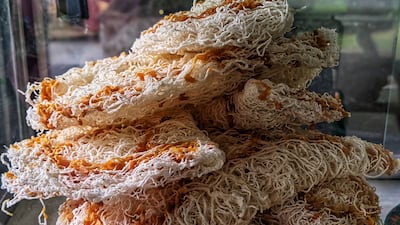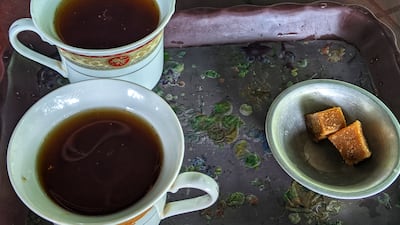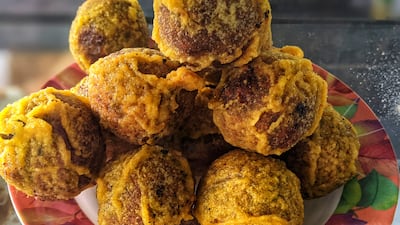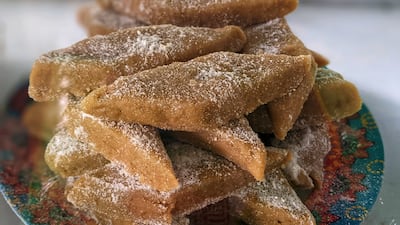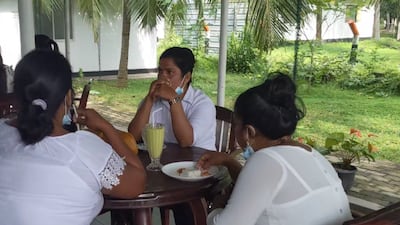With an enthusiastic smile, Dilshani KM, a gregarious Sinhalese woman dressed in an embroidered white top and skirt, quickly takes charge of her workstation. But not before donning her signature green apron, disposable transparent gloves and a mask.
“I have an order for kothu roti,” Dilshani, 36, says as she rapidly gathers the ingredients to prepare one of the most popular Sri Lankan delicacies, which is a combination of skill, taste and texture.
Dilshani heats up a hot flat pan while chopping the roti into small strips. She then tosses the strips with spices and an assortment of diced vegetables in a generous helping of oil, and wallops away with a pair of machete-style knives. Just a few minutes later, she serves the piping-hot kothu roti, topped with slit green chillies and finely sliced onion, to her customer.
Welcome to Hela Bojun Hala, an open-kitchen eatery in the lush Central Highlands of Sri Lanka. Here, local women (we counted nine on our visit) — all attired in green aprons and caps — dish up, in a jiffy, various delicacies from their own workstations. Others are occupied taking orders from customers, who swarm through the door from morning to evening.
Of the many big and small food outlets near by, only Hela Bojun Hala remains busy throughout the day.
What makes Hela Bojun Hala special?

Hela Bojun Hala, which translates to “traditional food courts” from the Sinhala, are a chain of local, women-led food outlets operating across Sri Lanka, under the tagline of “true Sri Lankan taste”. The eateries are established and administered by the Ministry of Agriculture and the provincial agricultural departments, to align with the United Nations project on biodiversity for food and nutrition.
The initiative recruits local women who are well versed in cooking, and trains them in hospitality and entrepreneurship, with a strong emphasis on cleanliness and hygiene. Subsequently, they are supplemented with financial assistance if needed, to set up workstations inside a Hela Bojun Hala.
vendor, Hela Bojun Hala, Kandy
Since the opening in 2006 of the first Hela Bojun Hala outlet in Kandy, a hill town in the Central Province, the initiative has trained 750 women entrepreneurs, with 22 outlets operating in urban areas.
At the centre where Dilshani works, 36 women work a six-hour shift so the opportunity to earn is equally distributed. The purpose of these ventures is, after all, women's empowerment.
The introduction of traditional food courts is one of the island’s major initiatives to fulfil a two-pronged objective: encouraging agriculture-based women entrepreneurship and reviving the present generation’s interest in indigenous Sri Lankan produce.
In an attempt to achieve the latter objective, the outlets encourage consumption of nutritious local food and snacks that are rich in indigenous millets, as well as fruits, cereals and jaggery. As such, the initiative also helps to turn around poor dietary habits among many Sri Lankans.
Ammachi Unavagam to the rescue
In the towns and cities of the once war-torn northern province Jaffna, Ammachi Unavagam or “grandma’s kitchen” from the Tamil, replace the Hela Bojun outlets of southern Sri Lanka, and serve authentic, nutrient-rich Tamil food to cater to the local population.
“We prepare everything with local ingredients,” says Lakshmi, who works at Ammachi Unavagam in Keerimalai, a pilgrimage centre on the outskirts of Jaffna. “Parippu vadai [lentil fritters] is the most popular snack here.”

The first Ammachi Unavagam outlet opened in 2017, to provide livelihood to war widows and other women whose lives had been disrupted by the 33-year civil war in Sri Lanka.
Even during the island nation’s recent food crisis, Hela Bojun Hala and Ammachi Unavagam centres were a boon for low-income groups and travellers alike, because they provided meals at affordable rates.
Bread and butter

“They serve fresh and tasty local food,” says Yasantha, who frequents the roadside Hela Bojun Hala where Dilshani works to buy pani-walalu (a Sri Lankan take on the coiled orange Indian sweetmeat jalebi) and aasmi (deep-fried rice flour and coconut milk) for his family, who live on the outskirts of Kandy.
Dilshani is one of the few remaining Sinhala women who still prepare traditional Sri Lankan delicacies, including aasmi and kola kenda, an ancient herbal porridge and drink.
“I sold home-made snacks for 10 years before I started working at this eatery two years ago, but Hela Bojun Hala has been a blessing to me,” she says while handing over half a dozen aasmi and pani-walalu to Yasantha.
Apart from financial independence, working here has helped entrepreneurs like Dilshani foster a sisterhood with their co-workers as well as to nurture a loyal customer base beyond the confines of the eatery.
Dilshani now sells her home-made snacks and beverages through Facebook, and takes orders over the phone. And while a few hundred Sri Lankan rupees go towards paying electricity and subsidised rent to the Ministry of Agriculture, the remaining amount is her profit, an income that, she says, “runs my family”.
